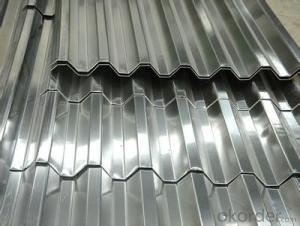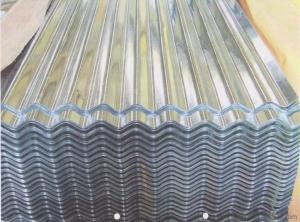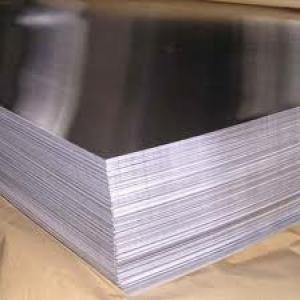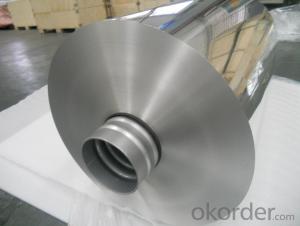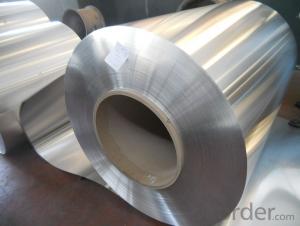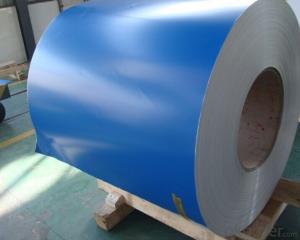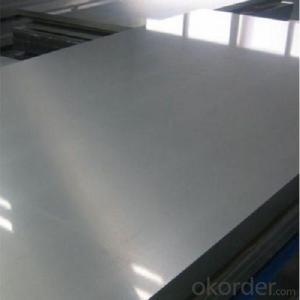aluminum sheet for corrugated
- Loading Port:
- China Main Port
- Payment Terms:
- TT OR LC
- Min Order Qty:
- -
- Supply Capability:
- -
OKorder Service Pledge
OKorder Financial Service
You Might Also Like
Aluminium alloys with a wide range of properties are used in engineering structures. Alloy systems are classified by a number system (ANSI) or by names indicating their main alloying constituents (DIN and ISO).
The strength and durability of aluminium alloys vary widely, not only as a result of the components of the specific alloy, but also as a result of heat treatments and manufacturing processes. A lack of knowledge of these aspects has from time to time led to improperly designed structures and gained aluminium a bad reputation.
One important structural limitation of aluminium alloys is their fatigue strength. Unlike steels, aluminium alloys have no well-defined fatigue limit, meaning that fatigue failure eventually occurs, under even very small cyclic loadings. This implies that engineers must assess these loads and design for a fixed life rather than an infinite life.
Another important property of aluminium alloys is their sensitivity to heat. Workshop procedures involving heating are complicated by the fact that aluminium, unlike steel, melts without first glowing red. Forming operations where a blow torch is used therefore require some expertise, since no visual signs reveal how close the material is to melting. Aluminium alloys, like all structural alloys, also are subject to internal stresses following heating operations such as welding and casting. The problem with aluminium alloys in this regard is their low melting point, which make them more susceptible to distortions from thermally induced stress relief. Controlled stress relief can be done during manufacturing by heat-treating the parts in an oven, followed by gradual cooling—in effect annealing the stresses.
The low melting point of aluminium alloys has not precluded their use in rocketry; even for use in constructing combustion chambers where gases can reach 3500 K. The Agena upper stage engine used a regeneratively cooled aluminium design for some parts of the nozzle, including the thermally critical throat region.
Another alloy of some value is aluminium bronze (Cu-Al alloy).
- Q:Can 101 aluminum sheets be purchased in small quantities or only in bulk?
- Aluminum sheets can typically be purchased in both small quantities and bulk, depending on the supplier and their policies. It is advisable to check with the specific supplier to determine the availability of purchasing 101 aluminum sheets in small quantities.
- Q:Can aluminum sheets be used for chemical storage containers?
- Yes, aluminum sheets can be used for chemical storage containers. Aluminum is known for its excellent corrosion resistance, which makes it suitable for storing a wide range of chemicals. It is also lightweight, durable, and non-reactive with most substances, making it a popular choice for chemical storage applications. Additionally, aluminum is easily formed and fabricated into various shapes and sizes, allowing for customized container designs. However, it is important to consider the specific chemical being stored and consult with experts to ensure compatibility and safety.
- Q:Can the aluminum sheets be painted or coated with a different color?
- Yes, aluminum sheets can be painted or coated with a different color.
- Q:Are aluminum sheets suitable for insulation cladding?
- Yes, aluminum sheets are suitable for insulation cladding. Aluminum is a lightweight, durable, and corrosion-resistant material that can effectively protect and insulate buildings. It provides excellent thermal and sound insulation properties, making it an ideal choice for cladding systems. Additionally, aluminum sheets are easy to install, maintain, and are available in various finishes and colors, allowing for design flexibility.
- Q:Are aluminum sheets suitable for electrical bus bars?
- Certain applications may find aluminum sheets suitable for use in electrical bus bars. Aluminum possesses several properties that make it a viable choice for bus bars. Firstly, aluminum is a lightweight material, which can be advantageous in situations where weight reduction is crucial. Furthermore, aluminum exhibits good electrical conductivity, although it falls short of copper in terms of conductivity. Nevertheless, aluminum bus bars can still handle high electrical currents and are commonly employed in power distribution systems. However, one drawback of aluminum bus bars is their higher resistance compared to copper bus bars. Consequently, they have a tendency to generate more heat, particularly under heavy current loads. To address this issue, aluminum bus bars are often designed with larger cross-sectional areas to minimize resistance and dissipate heat more effectively. Another challenge associated with aluminum bus bars is their vulnerability to oxidation and corrosion. This concern can be tackled by applying protective coatings or utilizing alloys that offer superior corrosion resistance. Additionally, it is crucial to ensure proper insulation and avoid contact with dissimilar metals to prevent galvanic corrosion. In conclusion, aluminum sheets can serve as suitable materials for electrical bus bars, particularly in scenarios where weight reduction is a priority. However, careful consideration must be given to factors such as electrical conductivity, heat dissipation, and corrosion resistance to ensure optimal performance and longevity of the bus bars.
- Q:Are aluminum sheets suitable for chemical processing applications?
- Yes, aluminum sheets are suitable for chemical processing applications. Aluminum is a versatile and widely used material in various industries, including chemical processing. It possesses excellent corrosion resistance properties, making it highly suitable for applications involving exposure to chemicals and corrosive environments. Aluminum sheets are resistant to many acids and alkalis, including common chemicals such as sulfuric acid, hydrochloric acid, and sodium hydroxide. Aluminum's corrosion resistance is due to the formation of a thin, protective oxide layer on its surface, which acts as a barrier against chemical attacks. This oxide layer can quickly reform if damaged, providing continuous protection to the underlying metal. Furthermore, aluminum is lightweight, has high thermal conductivity, and can be easily formed into different shapes and sizes, making it a preferred choice for various chemical processing equipment and components. In chemical processing applications, aluminum sheets are commonly used for storage tanks, heat exchangers, piping systems, and other equipment that come into contact with chemicals. They can withstand high temperatures and pressures, making them suitable for various processing conditions. Additionally, aluminum is non-toxic, non-magnetic, and has excellent electrical conductivity, which can be advantageous in certain chemical processes. However, it is essential to consider the specific chemical environment and conditions when selecting aluminum sheets for chemical processing applications. Some aggressive chemicals, such as strong bases or highly oxidizing acids, may require additional protection or alternative materials. It is recommended to consult with experts or engineers familiar with the specific chemical processes and conditions to ensure the suitability of aluminum sheets for a particular application.
- Q:How does the thickness of aluminum sheet affect its formability?
- The formability of an aluminum sheet is greatly impacted by its thickness. Generally, thinner sheets of aluminum are more easily shaped and are more malleable compared to thicker sheets. This is due to the fact that thinner sheets have less resistance to deformation and require less force to bend or stretch. On the other hand, thicker aluminum sheets have higher resistance to deformation and are less malleable. They necessitate more force and energy to shape, and are more susceptible to cracking or tearing during forming processes. Additionally, thicker sheets are more likely to experience springback, where the material partially returns to its original shape after being formed. The formability of aluminum sheets is also influenced by the specific forming process being used and the alloy composition. In certain cases, specific alloy compositions or heat treatments can enhance the formability of thicker sheets, making them easier to shape. In conclusion, the formability of an aluminum sheet is directly affected by its thickness. Thinner sheets are generally easier to shape and more malleable, while thicker sheets require more force and are less malleable. The alloy composition and specific forming processes being used can also impact the formability of aluminum sheets.
- Q:write a balanced equation for the reaction between aluminium metal and potassium hydroxide in water
- Potassium Aluminum Hydroxide
- Q:Are aluminum sheets suitable for welding?
- Aluminum sheets are indeed suitable for welding, being widely used in various industries for their lightweight, corrosion resistance, and excellent thermal conductivity. However, welding aluminum presents challenges due to its high thermal conductivity and the formation of an oxide layer on its surface. Nevertheless, successful welding of aluminum sheets can be achieved with proper techniques and equipment. Tungsten Inert Gas (TIG) welding and Metal Inert Gas (MIG) welding are commonly employed for aluminum welding. These processes allow for precise heat control and the use of shielding gases to protect the weld pool from oxidation. In addition, achieving strong and reliable welds requires proper surface preparation, cleaning, and the use of specialized aluminum welding wires or rods. Overall, while specific techniques and equipment may be necessary, welding aluminum is feasible and widely practiced in various industries.
- Q:What is the typical hardness of aluminum sheets?
- The typical hardness of aluminum sheets can vary depending on the specific alloy and tempering process used, but it generally falls within the range of 40-70 on the Rockwell B scale.
1. Manufacturer Overview |
|
|---|---|
| Location | |
| Year Established | |
| Annual Output Value | |
| Main Markets | |
| Company Certifications | |
2. Manufacturer Certificates |
|
|---|---|
| a) Certification Name | |
| Range | |
| Reference | |
| Validity Period | |
3. Manufacturer Capability |
|
|---|---|
| a)Trade Capacity | |
| Nearest Port | |
| Export Percentage | |
| No.of Employees in Trade Department | |
| Language Spoken: | |
| b)Factory Information | |
| Factory Size: | |
| No. of Production Lines | |
| Contract Manufacturing | |
| Product Price Range | |
Send your message to us
aluminum sheet for corrugated
- Loading Port:
- China Main Port
- Payment Terms:
- TT OR LC
- Min Order Qty:
- -
- Supply Capability:
- -
OKorder Service Pledge
OKorder Financial Service
Similar products
New products
Hot products
Related keywords
